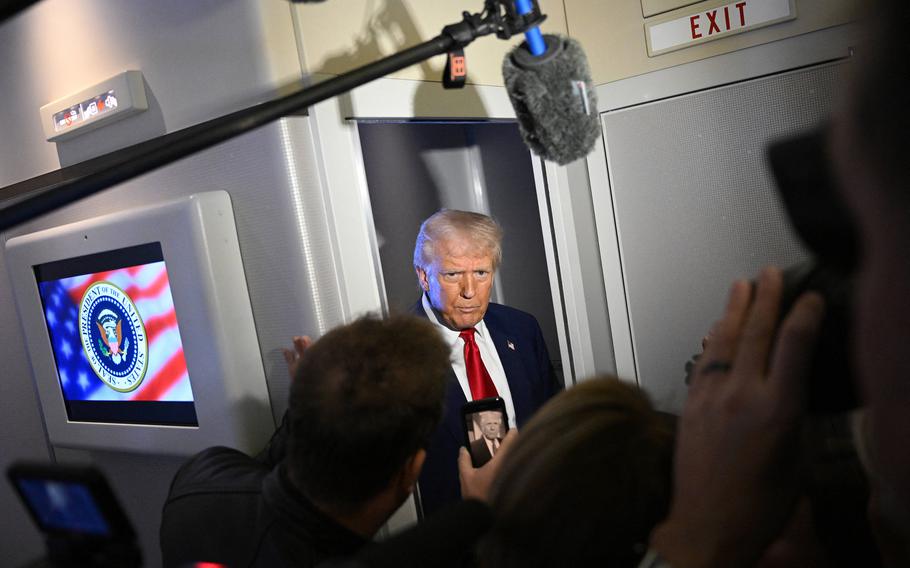U.S.
Trump says he thinks Iran will accept direct nuclear talks
Bloomberg News (TNS) April 5, 2025

US President Donald Trump speaks to reporters while in flight on board Air Force One, en route to Miami, Florida on April 3, 2025. Trump is traveling to the Trump National Doral Golf Club before going to his Mar-a-Lago Resort. (Mandel Ngan/AFP/Getty Images/TNS)
(Tribune News Service) — U.S. President Donald Trump said he believed Iran was willing to engage in direct talks over its nuclear program, a day after Tehran indicated it would only negotiate through intermediaries.
“Forget about letters, I think they want to have direct talks,” Trump told reporters aboard Air Force One on Thursday.
Trump said his preference was for a one-on-one conversation with Iran, and that he believed doing so could help ease dealmaking.
“I think it goes faster and you can understand the other side a lot better than if you go through intermediaries,” Trump said. “They wanted to use intermediaries. I don’t think that’s necessarily true anymore. I think they’re concerned. I think they feel vulnerable, and I don’t want them to feel that way.”
Iranian Foreign Minister Abbas Araghchi said Iran is prepared for “genuine negotiations, from a position of equality, and in an indirect manner” in a phone call with Dutch counterpart Caspar Veldkamp on Wednesday.
Iranian President Masoud Pezeshkian said last week that Supreme Leader Ayatollah Ali Khamenei had rejected the prospect of direct talks with Trump’s administration under his military threats.
In a letter sent last month, Trump told Khamenei he has a two-month deadline to reach a new accord.
The letter was delivered via the United Arab Emirates and a return message was sent to Trump via Oman. The UAE and Oman often act as mediators to resolve Middle Eastern conflicts and disputes, and have acted a go-betweens for Iran and the U.S.
Concerns between the West and Iran have heightened over the past 18 months, with Hamas’s attack on Israel triggering a multi-front conflict between the Jewish state and Iranian proxy militias. Israel and Iran twice fired missiles directly on each other last year, an unprecedented situation that briefly sparked fears of a war between the two countries.
Israel has threatened to strike Iran’s nuclear sites, something that would probably need to be coordinated with the U.S. to ensure it’s successful. Tehran has said any attack on its atomic facilities — which it says are for peaceful purposes only — would be tantamount to an act of war.
In 2018, Trump unilaterally withdrew the U.S. from a global agreement that curbed Iran’s nuclear activities in exchange for sanctions relief. Since returning to office, he has reintroduced his so-called “maximum pressure” campaign against Tehran, escalating sanctions and warning of possible military action if efforts for a new deal collapse.
With assistance from Josh Wingrove.
©2025 Bloomberg L.P.
Visit bloomberg.com.
Distributed by Tribune Content Agency, LLC.